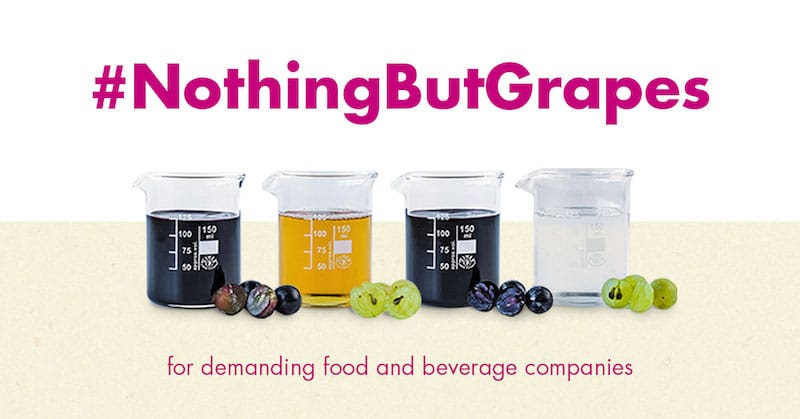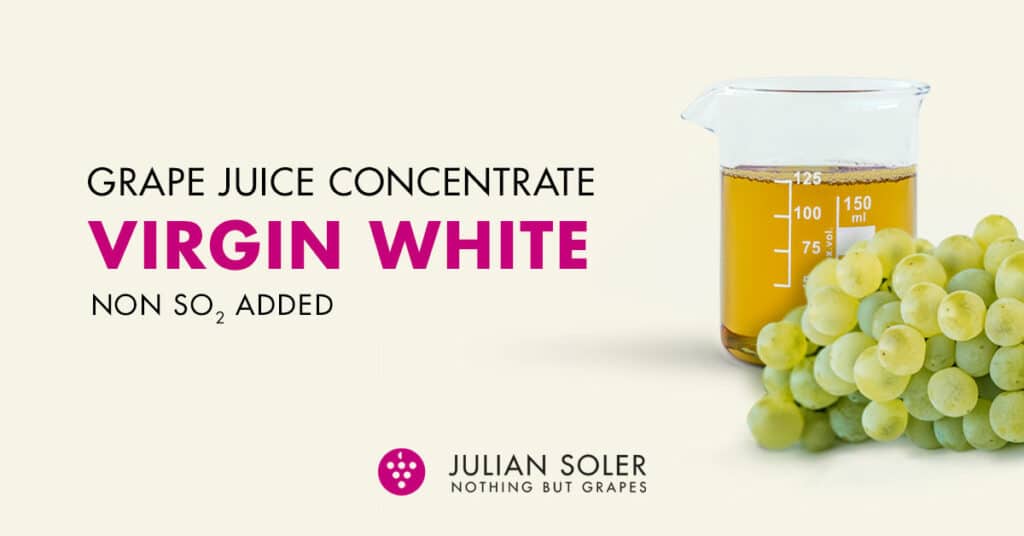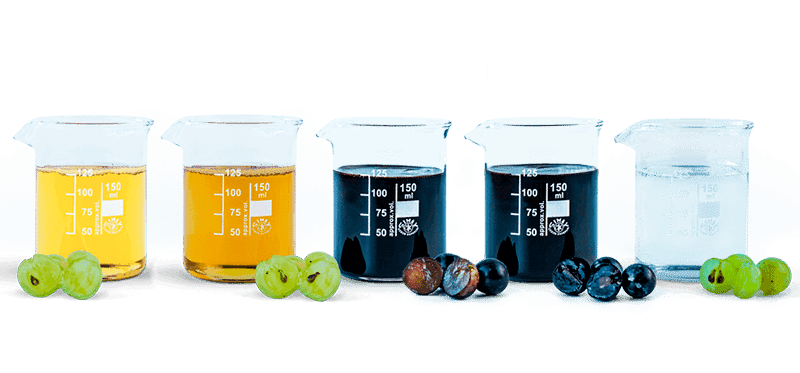Currently, the use of fruit juices as a base for the production of functional and healthy beverages is an increasingly noticeable trend. Grape juice is one of the ones that contributes the most antioxidants to isotonic or sports drinks. Moreover, must contains key bioactive compounds for the balance of the microbiota and provides electrolytes and other nutrients necessary after intense physical exercise.
Today, we explain in detail how this juice contributes to the development of effective isotonic beverages, with a significant impact on athletes’ performance and great health benefits.
- Isotonic drinks: what do they contain? How do they help the body?
- What grape juice brings to healthy isotonic beverages: minerals, natural sugars, and more.
- Isotonic beverages based on grape juice available in the market.
- Grape juice concentrate: the ideal alternative to enrich isotonic beverages.
Isotonic drinks: what do they contain? How do they help the body?
Electrolyte-rich isotonic beverages have the ability to replenish the water and minerals (calcium, sodium, magnesium, etc.) lost by the body during prolonged physical exertion. These drinks are composed of water, electrolytes, and carbohydrates. Typically, they also contain certain vitamins and nutrients. Furthermore, their color and flavor are often enhanced by the organoleptic properties of the juice used as a base.
- Electrolytes are substances known as sodium, potassium, magnesium, calcium, etc. They are responsible for regulating the electrochemical balance at the cellular level in the body. For example:
- They transport nutrients to the cells.
- They assist in storing carbohydrates in the muscles.
- They maintain the body’s water balance.
- They help balance pH and blood pressure.
- They contribute to the proper functioning of muscles and the nervous system.
- Carbohydrates are present in isotonic beverages in the form of sugars, such as glucose, maltodextrin, and fructose. They have a significant beneficial effect because:
- They serve as a source of energy for the muscles during physical exertion.
- They help maintain muscle glycogen.
- They enhance performance.
What grape juice brings to healthy isotonic beverages: minerals, natural sugars, and more.

Grape juice can provide natural sugars and the necessary minerals to develop healthy isotonic beverages rich in electrolytes. But in addition to this, grape juice also has the ability to enhance and increase the benefits of this type of energy drink in the body, allowing for a product with added value and making it more appealing. Why? Because grape juice contains:
- Phenolic compounds with significant antioxidant, anti-inflammatory, anti-aging, anticancer, and cardioprotective properties. Additionally, they have a positive impact on the intestinal microbiota.
- Natural sugars (fructose and glucose).
- Vitamins, mainly vitamin C, E, A, and K.
- Minerals, such as magnesium, iron, potassium, calcium, and phosphorus.
Grape juice concentrate as a source of polyphenols.
After an organism has been subjected to intense and prolonged exercise, it experiences severe physiological stress. At the cellular level, oxidative stress occurs (excess free radicals and lack of antioxidants), and there is also evidence of inflammation, muscular microtrauma, and gastrointestinal dysfunction.
In response to this, grape juice, which is rich in phenolic compounds (anthocyanins, resveratrol, flavonols, flavanols, phenolic acids…) with high antioxidant capacity, plays a crucial role. Consequently, this juice is associated with protection against oxidative damage, reduction of inflammation, and improvement of physical performance during workouts, thereby enhancing the benefits of isotonic beverages. Additionally, polyphenols are bioactive compounds that act in multiple ways to promote health, offering protection against viral infections and neurodegenerative and cardiovascular disorders, and reducing the likelihood of muscular and cardiac diseases.
Grape juice for maintaining microbiota balance.
As mentioned earlier, the polyphenols present in grape juice have significant biological activities, including aiding in the balance of the intestinal microbiota. Polyphenols and the microbiota have a bidirectional interaction, as the microbiota acts on the polyphenols to facilitate their absorption, and at the same time, the polyphenols act as a kind of probiotic, inhibiting the growth of pathogenic bacteria in the intestine and increasing the presence of beneficial bacteria.
The polyphenols that are not absorbed in the small intestine reach the colon and serve as a substrate for the microbial community. Specifically, intestinal bacteria metabolize the polyphenols to enhance their nutritional properties and availability, leading to the production of a fatty acid with significant capacity to prevent intestinal inflammation, metabolic disorders, and colon cancer. Additionally, the antimicrobial action of polyphenols protects the body from intestinal infections.
As a result, grape juice provides isotonic beverages with superior properties that improve the digestive system and enhance the ability to hydrate and absorb nutrients.
Furthermore, probiotic beverages like Kombucha have found an ideal source of antioxidants, vitamins, and beneficial polyphenols for digestive health and to improve the intestinal microbiota, thus supporting the body’s immune system. For example, Humm’s probiotic Kombucha soda, made with organic white grape juice and other plant-based ingredients.
Grape juice concentrate as a source of natural electrolytes.

Another key characteristic of grape juice concentrate is its electrolyte content. It contains potassium, magnesium, calcium, and phosphorus, the electrolytes that are lost through sweating during intense physical activities or exposure to high temperatures.
This is why grape juice can serve as a source of natural electrolytes to create completely organic and healthy beverages.
Grape juice concentrate as a natural sweetener and coloring agent.
Grape juice concentrate is a source of fructose and glucose, providing the necessary carbohydrates to isotonic beverages and aiding in glycogen replenishment.
Additionally, thanks to its fructose and glucose content, grape juice concentrate supplies natural sugars to these energy drinks, avoiding the need for artificial sweeteners and enhancing the product’s value and appeal.
Moreover, grape juice can be used as a natural coloring agent in sports beverages. This is because its polyphenols include anthocyanins, compounds responsible for the color of grapes, which, being soluble, allow grape juice to be used as a natural coloring agent.
Isotonic beverages based on grape juice available in the market.

Among the various organic isotonic electrolyte beverages that utilize the qualities of grape juice, the following are included:
- Recharge Grape by RW Knudsen, a completely organic sports beverage with electrolytes, made from concentrated Concord grape juice, white grape, and apple.
- CR7 Drive from the Herbalife line, a sports beverage developed by soccer player Cristiano Ronaldo. It includes grape juice, carrot juice, and other fruits.
- Bodyarmor Edge, an electrolyte sports drink containing concentrated grape juice, coconut water, and other natural ingredients.
Electrolytes, natural sugars, and the coloring power of grape juice are also currently utilized in the market for various completely organic electrolyte beverages for children. These drinks are free from artificial sweeteners, odors, and flavors, aiming to keep children hydrated after intense physical activity or in cases of vomiting and diarrhea. For example:
- Earth’s Best Grape Electrolyte Solution, a brand dedicated to organic food for babies and toddlers.
- Pedialyte Organic Hydration Solution with Electrolytes by Pedialyte, designed for children and adults.
Grape juice concentrate: the ideal alternative to enrich isotonic beverages.
Grape juice represents an ideal alternative for developing enriched isotonic beverages, highly beneficial for health. Grape juice concentrate can enhance the capabilities of these beverages, making them more effective in rehydrating the body, promoting energy, and replenishing electrolytes. Furthermore, it can also transform these isotonic beverages, rich in electrolytes, into probiotic options.
Indeed, grape juice concentrate has sweetening power and serves as a natural coloring agent, enabling the development of healthier isotonic and energizing beverages. Of course, to fully utilize all the nutrients, compounds, and organoleptic properties of the grape, it is essential to use high-quality grape juice concentrate.
At Julián Soler, we have developed a unique process to produce and offer the highest quality concentrated grape juice. We have the most cutting-edge technology to analyze and classify the raw material, ensuring quality control of the grape juice concentrate. We maintain product traceability and have appropriate refrigeration and freezing chambers to preserve the grape juice throughout the year, preserving its qualities intact.
For 100% natural and high-quality grape juice, contact us. At Julián Soler, we are specialists in both red and white grape juices and concentrates. We have our own R&D department to provide customized solutions when developing any unique recipe for innovative products.
Sources of reference used:
MDPI, Frontiers, MedicineNet, Ncbi, PubMed, Scielo, Julián Soler.




 by
by